News
Il progetto Tun.Re.Fit. premiato agli ITA Awards 2025
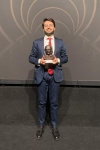 Un tunnel che produce energia e migliora la sicurezza stradale: è l’innovazione del Politecnico premiata agli ITA Awards 2025. Il progetto Tun.Re.Fit., sviluppato dal team del Dipartimento di Ingegneria Strutturale, Edile e Geotecnica-DISEG (Marco Barla, Simone De Feudis e Alessandra Insana), ha ottenuto il secondo posto nella categoria Technical Innovation of the Year.
Un tunnel che produce energia e migliora la sicurezza stradale: è l’innovazione del Politecnico premiata agli ITA Awards 2025. Il progetto Tun.Re.Fit., sviluppato dal team del Dipartimento di Ingegneria Strutturale, Edile e Geotecnica-DISEG (Marco Barla, Simone De Feudis e Alessandra Insana), ha ottenuto il secondo posto nella categoria Technical Innovation of the Year.
L'articolo di Poliflash: https://www.polito.it/ateneo/comunicazione-e-ufficio-stampa/poliflash/il-progetto-tunrefit-premiato-agli-ita-awards-2025
Il video che descrive l'innovazione: https://youtu.be/z5ve0IVz_kU
La geotermia che non ti aspetti a Solar Solutions Torino
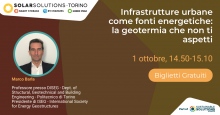 Infrastrutture urbane come fonti energetiche: la geotermia che non ti aspetti. Le innovazioni del Politecnico di Torino a Solar Solutions Torino, il nuovo Summit dedicato alle Rinnovabili nel Nord Italia. Il seminario di Marco Barla si terrà il 1 ottobre alle 14.50 a Lingotto Fiere. Iscriviti qui per ottenere un biglietto gratuito: https://invt.io/1fxbqb5dmg5
Infrastrutture urbane come fonti energetiche: la geotermia che non ti aspetti. Le innovazioni del Politecnico di Torino a Solar Solutions Torino, il nuovo Summit dedicato alle Rinnovabili nel Nord Italia. Il seminario di Marco Barla si terrà il 1 ottobre alle 14.50 a Lingotto Fiere. Iscriviti qui per ottenere un biglietto gratuito: https://invt.io/1fxbqb5dmg5
Eurock 2025 in Trondheim
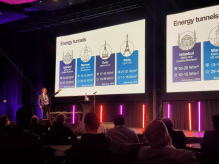 From June 16 to 20, our team took part in EUROCK 2025 (ISRM) in Trondheim (Norway) — one of the most important international conferences in the field of rock mechanics and engineering!
From June 16 to 20, our team took part in EUROCK 2025 (ISRM) in Trondheim (Norway) — one of the most important international conferences in the field of rock mechanics and engineering!
Marco Barla delivered a Keynote Lecture , titled "The design of energy tunnels for a sustainable future", offering a forward-thinking perspective on the role of energy tunnels as sustainable infrastructure.
Our researcher Maria Lia Napoli contributed with the study "Validation of the rockfall SIF and SAI indexes by a 3D analysis of a rock slope in Valsesia Valley (Italy)", using 3D modeling to validate predictive indexes on a real slope.
Lorenzo Milan discussed "A rational method for assessing the occurrence of brittle failure in deep tunnels", proposing a rational and predictive approach to brittle behavior in deep tunnel environments.
Giulia Torsello presented her experimental research on "Mode I fracture toughness of a low-porosity rock subjected to freeze-thaw cycles", addressing durability issues in cold climate conditions.
Maria Teresa Carriero presented her work "Estimation of the Failure Probability of Attenuator Rockfall Protection Structures Using a Reliability Analysis Approach (RBD) and Kriging Metamodel", combining advanced reliability analysis and metamodeling for rockfall protection design.
On top of the scientific program, Maria Teresa and Giulia Torsello took part in the RockBowl, an international competition that challenges young researchers with both technical and non-technical questions on rock mechanics and engineering. With the support of Maria Rita Migliazza as their faculty tutor, they achieved a fantastic second place!
Maria Teresa was awarded Best Player, while Giulia received the Best Paper – Young Category award for the scientific excellence of her work.
Swipe through to relive the highlights: presentations, discussions, and all the energy of a passionate geotechnical research team!
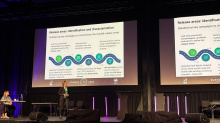

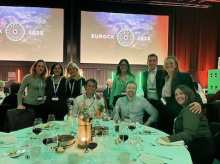
Maria Romana Alvi finalist at the Young Academics Award 2024
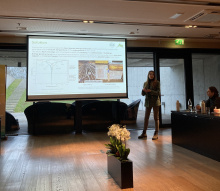 On January 21, 2025 Maria Romana Alvi attended the Finalists Workshop for the Young Academics Award 2024, held in Brdo pri Kranju, Slovenia.This edition of the Alpine Convention's Young Academics Award focused on “Responding to Environmental Changes and Maintaining a High Quality of Life in the Alps” and Maria's master's thesis "Thermal Performance Assessment of an Energy Lining in the Turin-Lyon Base Tunnel", with supervisors Marco Barla and Alessandra Insana, was selected as one of the noteworthy contributions for sustainable development in the Alps.The research highlighted how thermal activation in hot tunnels, such as those in the Alpine region, could harness heat from the surrounding environment. This process has the potential to generate clean energy to meet the thermal needs of local Alpine communities while also reducing the ventilation requirements of the tunnel.
On January 21, 2025 Maria Romana Alvi attended the Finalists Workshop for the Young Academics Award 2024, held in Brdo pri Kranju, Slovenia.This edition of the Alpine Convention's Young Academics Award focused on “Responding to Environmental Changes and Maintaining a High Quality of Life in the Alps” and Maria's master's thesis "Thermal Performance Assessment of an Energy Lining in the Turin-Lyon Base Tunnel", with supervisors Marco Barla and Alessandra Insana, was selected as one of the noteworthy contributions for sustainable development in the Alps.The research highlighted how thermal activation in hot tunnels, such as those in the Alpine region, could harness heat from the surrounding environment. This process has the potential to generate clean energy to meet the thermal needs of local Alpine communities while also reducing the ventilation requirements of the tunnel.
Unlocking underground energy
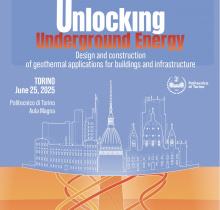 Energy Geostructures represent an innovative frontier in geothermal technology, transforming buildings and infrastructure into active sources of energy. This international event will explore the design and construction challenges to accelerate the adoption of these cutting-edge solutions in the market.
Energy Geostructures represent an innovative frontier in geothermal technology, transforming buildings and infrastructure into active sources of energy. This international event will explore the design and construction challenges to accelerate the adoption of these cutting-edge solutions in the market.
The workshop is organized in the framework of the annual meeting of the COST Action CA21156 “Fostering Large Scale Implementation of Energy Geostructures” (Foliage), the “Driving Urban Transitions project REuse for ENergy Exploitation and Storage of Existing Urban Tunnels in Europe” (Regenerate), and the National Research Project PRIN 2022 “Closing Knowledge Gaps on Energy Geostructures for Retrofitting Buildings and Infrastructures” (Georefit). Thanks to the research outcomes of these three projects, the workshop will provide an overview of the latest technologies and showcase successful international case studies.
World-renowned experts will present innovative solutions, while companies in the sector will share relevant examples applicable to the Italian market. The workshop is open to professionals, students, and academics. It will be held in English and will offer professional continuing education credits for engineers, geologists, and architects. A unique opportunity for professional development and networking with leading figures in the Energy Geostructures field!
The registration is free of charge. All registration procedures will be via the online registration form available at www.energygeostructures.org. You can sign up until all available spots are filled. Registrations will be accepted on a first-come, first-served basis.
A significant milestone for the Italian Demonstrator of the ARV European project
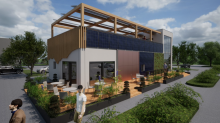 The first innovative technology in the new building under construction in the Ex-Zuffo parking lot of Trento has been installed by the Rockmech Team within the H2020 ARV project. This cutting-edge technology is based on the thermal activation of the foundation slab and walls (Geothermskin).
The first innovative technology in the new building under construction in the Ex-Zuffo parking lot of Trento has been installed by the Rockmech Team within the H2020 ARV project. This cutting-edge technology is based on the thermal activation of the foundation slab and walls (Geothermskin).
Al via il progetto internazionale REGENERATE
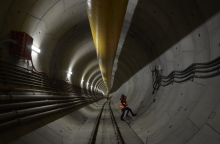 Il progetto coinvolge 17 partner accademici e tecnici da tutta Europa e punta a rigenerare il patrimonio sotterraneo esistente per produrre e stoccare energia
Il progetto coinvolge 17 partner accademici e tecnici da tutta Europa e punta a rigenerare il patrimonio sotterraneo esistente per produrre e stoccare energia
Assessing the interaction of an energy tunnel with the underground thermal conditions
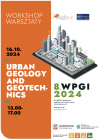 Today at the joint ELGIP - EGS UGEG Workshop on "Urban Geology & Geotechnics", the Politecnico di Torino DISEG was represented by Marco Barla and Alessandra Insana who showed the methodology for assessing the interaction of an energy tunnel with the underground thermal conditions in an urban area. The study unveiled the importance of considering the current geothermal use of the subsoil of a metropolitan area when designing a new shallow geothermal system. This allows not to hinder future energy exploitation and optimises its use. The case study investigated is that of the Turin Metro Line 2 which is planned to be thermally activated both in the cut and cover sections, thanks to energy diaphragm walls, and in the TBM tunnel sections, using Enertun segments. The impact of the energy tunnel was shown to be restricted to the depths of the infrastructure bearing a limited extension with respect to the thermally altered zones originating from the open loop systems.
Today at the joint ELGIP - EGS UGEG Workshop on "Urban Geology & Geotechnics", the Politecnico di Torino DISEG was represented by Marco Barla and Alessandra Insana who showed the methodology for assessing the interaction of an energy tunnel with the underground thermal conditions in an urban area. The study unveiled the importance of considering the current geothermal use of the subsoil of a metropolitan area when designing a new shallow geothermal system. This allows not to hinder future energy exploitation and optimises its use. The case study investigated is that of the Turin Metro Line 2 which is planned to be thermally activated both in the cut and cover sections, thanks to energy diaphragm walls, and in the TBM tunnel sections, using Enertun segments. The impact of the energy tunnel was shown to be restricted to the depths of the infrastructure bearing a limited extension with respect to the thermally altered zones originating from the open loop systems.
Climate change impacts on landslides in Alpine areas using a machine learning-based approach and detection sensors
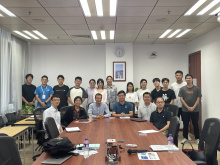 Managing climate change impacts on landslides in Alpine areas using a machine learning-based approach and detection sensors. An update on the Rockmech group's ongoing work was presented at the 4th Macao International Conference on Smart City Technologies - Powering Resilient and Sustainable Cities: Innovations in AIOT. To manage the risk associated to destructive natural events in the Alpine areas, whose occurrence is being modified by global warming, the need arises to update susceptibility maps to include climate change effects. An example of a machine learning-based approach has been shown. Based on the identified risk, EWS, such as the new cutting-edge fibre optic-based detection system Optialp, can be successfully implemented to mitigate risk and save human lives. The work prepared by Alessandra Insana, Valerio De Biagi and Amirreza Pourfatollah was presented by Marco Barla as an invited speaker at the conference.
Managing climate change impacts on landslides in Alpine areas using a machine learning-based approach and detection sensors. An update on the Rockmech group's ongoing work was presented at the 4th Macao International Conference on Smart City Technologies - Powering Resilient and Sustainable Cities: Innovations in AIOT. To manage the risk associated to destructive natural events in the Alpine areas, whose occurrence is being modified by global warming, the need arises to update susceptibility maps to include climate change effects. An example of a machine learning-based approach has been shown. Based on the identified risk, EWS, such as the new cutting-edge fibre optic-based detection system Optialp, can be successfully implemented to mitigate risk and save human lives. The work prepared by Alessandra Insana, Valerio De Biagi and Amirreza Pourfatollah was presented by Marco Barla as an invited speaker at the conference.
The three days at the University of Macao were also a great opportunity to meet the researchers and PhD students working with Prof. Wan-Huan Zhou and open new opportunities for Polito-UM collaboration.
La galleria anti-ghiaccio
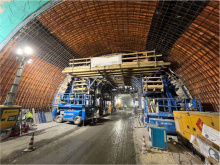 Oggi, su La Stampa e Il Secolo XIX, si è parlato del sistema di anti-gelo geotermico sviluppato nell'ambito del Dottorato di Ricerca di Simone De Feudis, sotto la supervisione dei Proff. Marco Barla e Alessandra Insana ed in collaborazione con Autostrade per l'Italia.
Oggi, su La Stampa e Il Secolo XIX, si è parlato del sistema di anti-gelo geotermico sviluppato nell'ambito del Dottorato di Ricerca di Simone De Feudis, sotto la supervisione dei Proff. Marco Barla e Alessandra Insana ed in collaborazione con Autostrade per l'Italia.
Sfruttando il calore geotermico dell'ammasso roccioso a tergo della galleria Olimpia (Alessandria), si previene la formazione di ghiaccio su una porzione della della corsia di emergenza all'esterno del fornice. A tal fine, la galleria Olimpia è stata attivata termicamente durante i lavori di rinnovo strutturale del rivestimento, risultando così un unicum al mondo nel suo genere.
Dopo aver dimostrato la bontà e la viabilità del sistema in via preliminare (https://iris.polito.it/handle/11583/2989386), i primi risultati della sperimentazione in vera grandezza sono attesi per il prossimo inverno.
